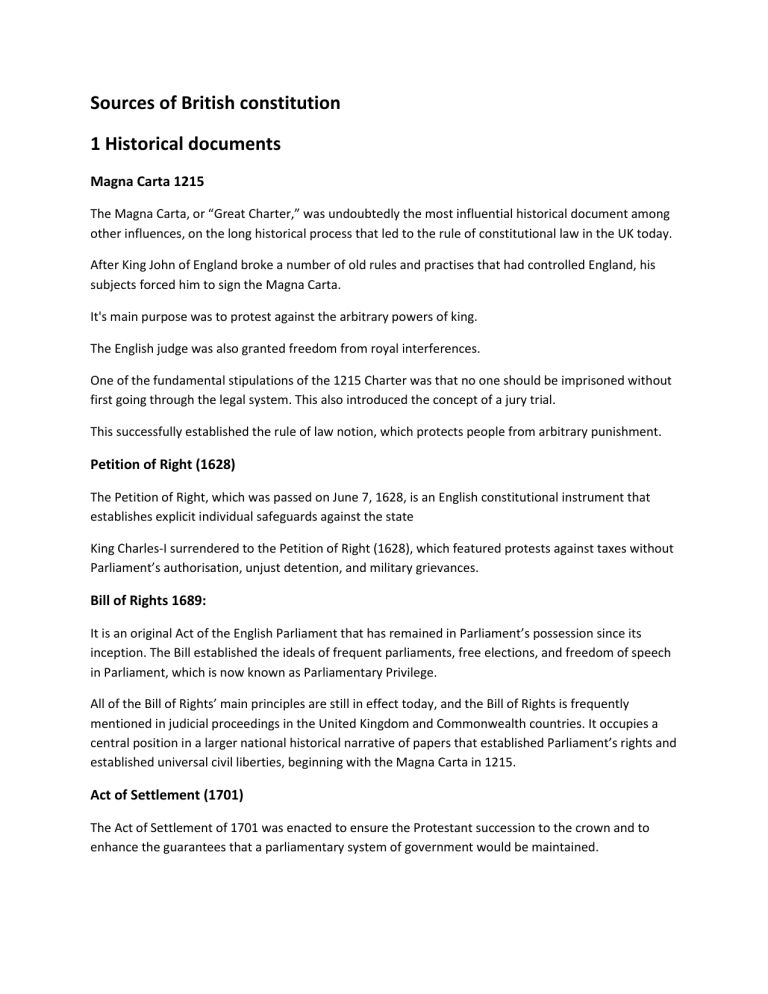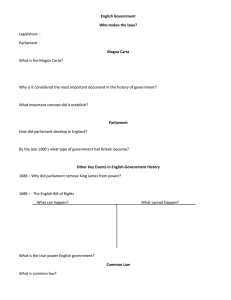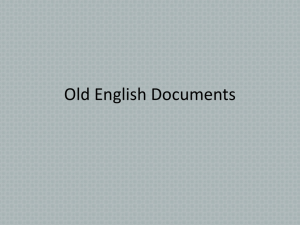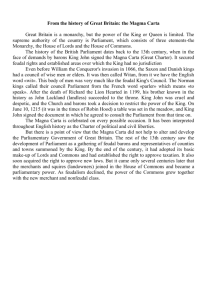
Sources of British constitution 1 Historical documents Magna Carta 1215 The Magna Carta, or “Great Charter,” was undoubtedly the most influential historical document among other influences, on the long historical process that led to the rule of constitutional law in the UK today. After King John of England broke a number of old rules and practises that had controlled England, his subjects forced him to sign the Magna Carta. It's main purpose was to protest against the arbitrary powers of king. The English judge was also granted freedom from royal interferences. One of the fundamental stipulations of the 1215 Charter was that no one should be imprisoned without first going through the legal system. This also introduced the concept of a jury trial. This successfully established the rule of law notion, which protects people from arbitrary punishment. Petition of Right (1628) The Petition of Right, which was passed on June 7, 1628, is an English constitutional instrument that establishes explicit individual safeguards against the state King Charles-I surrendered to the Petition of Right (1628), which featured protests against taxes without Parliament’s authorisation, unjust detention, and military grievances. Bill of Rights 1689: It is an original Act of the English Parliament that has remained in Parliament’s possession since its inception. The Bill established the ideals of frequent parliaments, free elections, and freedom of speech in Parliament, which is now known as Parliamentary Privilege. All of the Bill of Rights’ main principles are still in effect today, and the Bill of Rights is frequently mentioned in judicial proceedings in the United Kingdom and Commonwealth countries. It occupies a central position in a larger national historical narrative of papers that established Parliament’s rights and established universal civil liberties, beginning with the Magna Carta in 1215. Act of Settlement (1701) The Act of Settlement of 1701 was enacted to ensure the Protestant succession to the crown and to enhance the guarantees that a parliamentary system of government would be maintained. 2. Acts of Parliament : An Act of the UK Parliament is an action or a step taken by the Parliament that enact new legislation or modifies existing legislation. An Act is a Bill that has received Royal Assent from the Monarch after being approved by both the House of Commons and the House of Lords. Acts of Parliament, when taken collectively, make up what is known in the United Kingdom as Statute Law. These acts of influential value which have a constitutional significance, include the Act of Habeas Corpus (1679), the Act of Settlement (1701), the Reform Acts of 1832, 1867, 1884, 1918, and 1928, the Parliament Acts of 1911 and 1949, and the West Minister’s Statute of 1931, among others. 3. Common Law The third branch of law is common law. Common law, often known as case law or precedent, is a body of law created by judges, courts, and other tribunals. It is one of the many sources of the unwritten constitution of the United Kingdom. It will be mentioned in rulings that decide particular cases, but it may also have precedential implications for future cases. The majority of the rights that the British people have today are the result of legal battles. 4. Convention : Constitutional conventions play an important role in the uncodified British constitution. Some regulations are followed by the various constituent components despite the fact that they are not written in any legally binding instrument. There are often underlying enforcing principles that are not codified. A convention is a rule referring to strict behaviour that does not have the authority of law. Certainly, repeated practice can become formalised as a norm of conduct and, in that sense, become customs. Conventions are however obeyed by the people because they are extremely beneficial to the government’s smooth operation. Written conventions include ‘the Cabinet Manual‘ and ‘the Ministerial Code.’ 5. Works of authority On England’s constitutional law, legal authorities and notable jurists have written opinions. Arson’s Law and Customs of Constitution, May’s Parliamentary Practice, and Dicey’s Law of Constitution are considered authoritative commentaries on English constitutional law and practice. 6. Precedent: 1. Judgement should be given by competent court. 2. The decision should be made with prudence. 3. It is automatically binding on lower courts.





